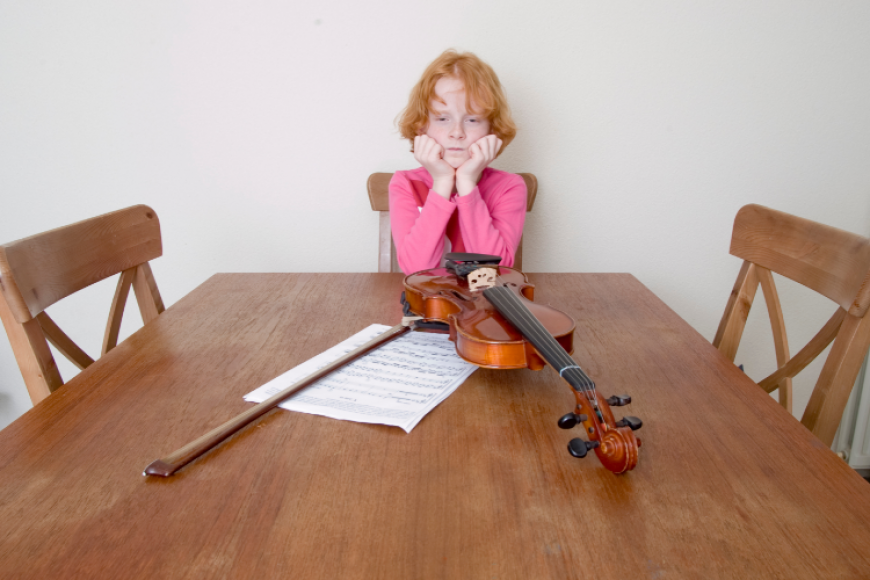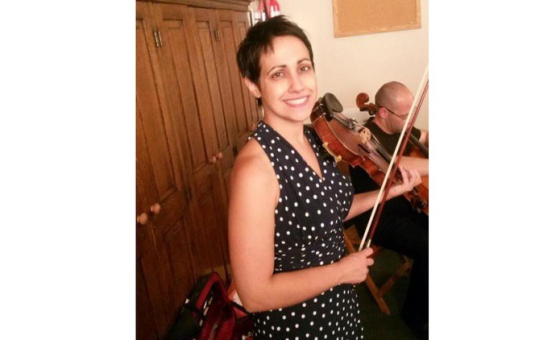Nurturing Your Child's Motivation for Music Lessons

Esther Howard is a professional musician who teaches Violin lessons online. Find out more on her Lessonface profile.
Help! My Kid Wants to Quit!
When little Becky started piano lessons, she was so excited! She sat at the piano every day, playing anything. Even if it didn’t sound like much to mom and dad, she smiled and banged away at the keys. She eagerly anticipated her lessons. She listened carefully to her teacher and practiced every day without being asked. She was really starting to get the hang of it, and she really seemed to love it!
Then suddenly, in what seemed like overnight, something changed. She started complaining about the lessons; she wanted to do something else instead. She hardly ever played at the piano and rarely practiced without being bribed. She just didn’t seem to love it like she used to. What should mom and dad do? Should they give up and let Becky quit? Should they force her to keep doing something that doesn’t make her happy? Are those their only choices?
The Inevitable Slump
Why does this happen? How does an enthusiastic student become a frustrated, disinterested one? There can be many reasons for this. One common cause is unrealistic expectations. This can happen to any student, even the very young. Usually, students become interested in music because they hear someone else play. They attend a concert or hear an older sibling perform, and they think, “I want to do that!” Unfortunately, learning to play a musical instrument well does not happen overnight. Learning to make a good sound, play rhythmically, and play accurately, takes a lot of patience and practice. It can be frustrating for anyone starting out because progress can seem slow.
Conversely, a student may make progress quickly in the beginning. This can lead to a false sense of security. They may even think, “Hey, this is easy!” Then, when things become more challenging, they can become discouraged. Things aren’t progressing as fast as they did at the outset, and they start to feel that they are not cut out for music playing.
There can be so many reasons why a student experiences this slump, but it is sure to happen. It can be a major slump, such as in the examples described above, or it can be a minor slump. For example, little Becky may realize she would rather play than attend practice today, or she is just having an off day and doesn’t feel like facing the challenges that music-learning presents. Whatever the cause, the important thing is overcoming that feeling so that the student’s desire for music is restored. How can parents help?
Parents, Be Prepared
The key to successfully helping a student over this slump is parental preparation. First, we have to recognize, as parents, that our children are not always going to maintain a high level of enthusiasm for their musical journey. This is normal. Their zeal will ebb and flow over time, and it is our job to help them to navigate those times when they feel like giving up. Below is a list of great ideas to help a student whose interest is waning. Remember, we don’t have to wait until we notice a problem to implement these ideas. By putting them into practice early on, we can help to build enthusiasm from the outset. If students set out with a high level of enthusiasm and parental involvement, they are less likely to want to give up when challenges arise.
Here we go, our awesome list of tools to battle the inevitable slump:
• Set a regular practice routine
• Attend classes regularly
• Set goals and display them in the home
• Set a goal to learn a popular theme song
• Communicate with your child’s music teacher
• Schedule mini performances in the home and over Zoom
• Attend community performances (whether in person or virtually)
• Let your child teach you what he or she is learning
• Provide proper equipment and space
• Avoid Discouraging words
• Make “Never Give Up” your motto!
By employing one or more of these suggestions, parents can set their children up for success. Students are less likely to want to give up if they feel the support and commendation of their friends and family. They are also more likely to succeed if they have a non-negotiable routine of practice and lesson attendance. All of this, coupled with a positive attitude, is sure to bolster the disheartened young musician. But what about older learners?
This goes for you too!
Being an adult learner can present unique problems. We aren’t as dexterous as our younger counterparts, and we have the added stress of work and family, but in reality, much of the time, adult learners face discouragement for the same reasons that young learners do. As noted before, learning to play an instrument is difficult, and it can be very discouraging when we do not make progress as quickly as we had anticipated. If you are an older beginner and you are starting to feel like turning your instrument into a wall decoration, review the suggestions above. Then ask yourself these questions:
• Do I have a regular time set aside for practice?
• Do I regularly attend my lessons or am I apt to cancel for minor reasons?
• Have I set personal goals, and do I practice with those goals in mind?
• Do I perform for my friends and family?
• Do I pump myself up with a “Can Do” attitude?
By honestly reviewing these questions, adult learners will be able to see areas for improvement. Just like with young learners, regular practice and instruction are key. Additionally, sharing what you are learning with friends and family can give you the boost you need to keep going. Yes, it can be intimidating to perform for others, but it can also be so encouraging as you feel the support of friends and family. If you are experiencing discouragement, take some time to tweak your approach and you will overcome the desire to give up.
They Can Do It!
Remember, we never hear people say, “I wish I had never learned to play a musical instrument!” We do hear people say, “I wish I had learned to play an instrument.” In fact, we often hear people say, “I wish my parents had made me stick to it.” If you are the parent of a younger musician, it can feel like a battle helping a student overcome this slump, but remember, your child (and you!) will be so grateful if she does not give up. If you are an adult beginner, don’t be deterred. You can reach your musical goals. Persevering through the difficult patches leads to a lifetime of rewarding musical joy!
 |
ABOUT ESTHER
My passion is music! I started to play the piano and violin when I was five years old. Through the years, I learned many instruments, but finally focused on violin. I have performed professionally throughout the years with many different musical groups...I have been teaching music privately for almost 25 years and have taught students from the age two to ninety. I love music and I love teaching. I look forward to helping you on your musical adventure! |
Esther's lessons are rated five stars over 100 verified student reviews, like this one:
My 6-year-old is new to the violin. She loves her lessons but can have a tendency to want to drift off task. Esther has such a wonderful way of engaging her and bringing her attention back to the lesson, gently but quickly. As a result, my daughter has learned a lot, looks forward to practicing, and can't wait to learn more. We feel very lucky to have Esther as her first teacher.
-Verified Student, review from September 27, 2021




